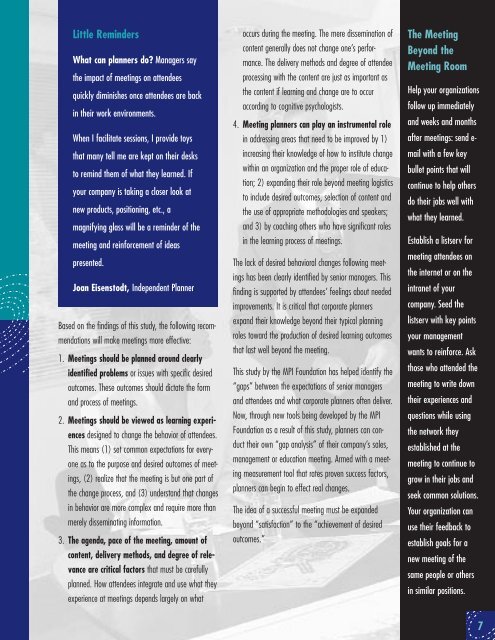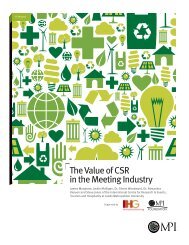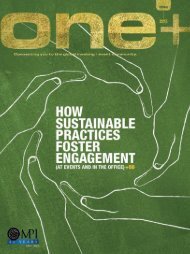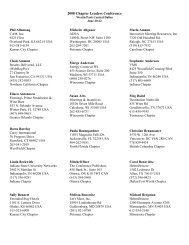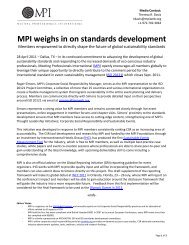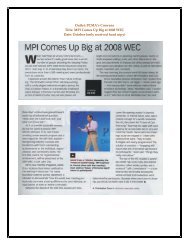1-white paper - Meeting Professionals International
1-white paper - Meeting Professionals International
1-white paper - Meeting Professionals International
You also want an ePaper? Increase the reach of your titles
YUMPU automatically turns print PDFs into web optimized ePapers that Google loves.
Little Reminders<br />
What can planners do? Managers say<br />
the impact of meetings on attendees<br />
quickly diminishes once attendees are back<br />
in their work environments.<br />
When I facilitate sessions, I provide toys<br />
that many tell me are kept on their desks<br />
to remind them of what they learned. If<br />
your company is taking a closer look at<br />
new products, positioning, etc., a<br />
magnifying glass will be a reminder of the<br />
meeting and reinforcement of ideas<br />
presented.<br />
Joan Eisenstodt, Independent Planner<br />
Based on the findings of this study, the following recommendations<br />
will make meetings more effective:<br />
1. <strong>Meeting</strong>s should be planned around clearly<br />
identified problems or issues with specific desired<br />
outcomes. These outcomes should dictate the form<br />
and process of meetings.<br />
2. <strong>Meeting</strong>s should be viewed as learning experiences<br />
designed to change the behavior of attendees.<br />
This means (1) set common expectations for everyone<br />
as to the purpose and desired outcomes of meetings,<br />
(2) realize that the meeting is but one part of<br />
the change process, and (3) understand that changes<br />
in behavior are more complex and require more than<br />
merely disseminating information.<br />
3. The agenda, pace of the meeting, amount of<br />
content, delivery methods, and degree of relevance<br />
are critical factors that must be carefully<br />
planned. How attendees integrate and use what they<br />
experience at meetings depends largely on what<br />
occurs during the meeting. The mere dissemination of<br />
content generally does not change one’s performance.<br />
The delivery methods and degree of attendee<br />
processing with the content are just as important as<br />
the content if learning and change are to occur<br />
according to cognitive psychologists.<br />
4. <strong>Meeting</strong> planners can play an instrumental role<br />
in addressing areas that need to be improved by 1)<br />
increasing their knowledge of how to institute change<br />
within an organization and the proper role of education;<br />
2) expanding their role beyond meeting logistics<br />
to include desired outcomes, selection of content and<br />
the use of appropriate methodologies and speakers;<br />
and 3) by coaching others who have significant roles<br />
in the learning process of meetings.<br />
The lack of desired behavioral changes following meetings<br />
has been clearly identified by senior managers. This<br />
finding is supported by attendees’ feelings about needed<br />
improvements. It is critical that corporate planners<br />
expand their knowledge beyond their typical planning<br />
roles toward the production of desired learning outcomes<br />
that last well beyond the meeting.<br />
This study by the MPI Foundation has helped identify the<br />
“gaps” between the expectations of senior managers<br />
and attendees and what corporate planners often deliver.<br />
Now, through new tools being developed by the MPI<br />
Foundation as a result of this study, planners can conduct<br />
their own “gap analysis” of their company’s sales,<br />
management or education meeting. Armed with a meeting<br />
measurement tool that rates proven success factors,<br />
planners can begin to effect real changes.<br />
The idea of a successful meeting must be expanded<br />
beyond “satisfaction” to the “achievement of desired<br />
outcomes.”<br />
The <strong>Meeting</strong><br />
Beyond the<br />
<strong>Meeting</strong> Room<br />
Help your organizations<br />
follow up immediately<br />
and weeks and months<br />
after meetings: send email<br />
with a few key<br />
bullet points that will<br />
continue to help others<br />
do their jobs well with<br />
what they learned.<br />
Establish a listserv for<br />
meeting attendees on<br />
the internet or on the<br />
intranet of your<br />
company. Seed the<br />
listserv with key points<br />
your management<br />
wants to reinforce. Ask<br />
those who attended the<br />
meeting to write down<br />
their experiences and<br />
questions while using<br />
the network they<br />
established at the<br />
meeting to continue to<br />
grow in their jobs and<br />
seek common solutions.<br />
Your organization can<br />
use their feedback to<br />
establish goals for a<br />
new meeting of the<br />
same people or others<br />
in similar positions.<br />
7


